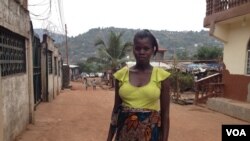As Sierra Leone prepares to reopen its schools, closed since last year due to the worst Ebola outbreak in history, the government has announced a ban on pregnant girls attending class because it says they set a bad example.
The director of Amnesty International in Sierra Leone, Solomon Sogbandi, is concerned about the government’s policy.
Sogbandi says not allowing girls into classes is a violation of their human rights.
“It is a human rights issue. When you look at the education act of 2004, it makes it clear, it says on no account should any child should be discriminated against. This is a serious provision we want government to look at," said Sogbandi.
The ban on pregnant girls in class is not new, it has been in place since 2010. But Sogbandi says the government should make an exception because of the Ebola crisis and the impact it has had on the young women.
He says there has been an increase in sexual violence and unwanted teenage pregnancies during Ebola.
“But fact of matter is the situation is a bit abnormal, it is not of their own making, there has been no effective teaching or learning situation due to the fact that the Ebola disease has put a halt on all practices and activities that pupils should undertake," he said.
As schools set to open Tuesday, girls like Isatu Gbankay, have no choice but to stay back.
The 17-year-old explains in her native Krio dialect that she can not go to school because of her pregnancy and is not happy.
She does not like the policy and wants to join her friends in class.
"I was raped by a fellow student. He forced me to have sex while I was fetching water for my family. I hope the government will make an exception for girls like me," said Gbankay.
Ministry of Education and Technology public relations officer Brima Michael Turay says the government will not change its policy.
He says even if they made an exception for pregnant girls, chances are they would not attend. There is a great shame when a school girl becomes pregnant in Sierra Leone's culture, he says, and much of the time the family tries to hide it
“They will isolate that child, they would not want neighbors to know she got pregnant under their care. They would take that child to a family somewhere, the girl would deliver the child and return back to her original house and no one would know she had that child," said Turay.
He also said that with vomiting being an Ebola symptom as well as a common side effect of pregnancy, the girls are better off to be at home. That way there is no fear of a suspected Ebola case and an increase for panic among students and teachers.
Turay adds the ministry will consider alternative options for pregnant girls if suggestions are made, but at this point there will be no exceptions.




